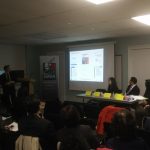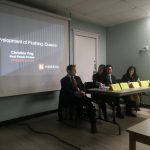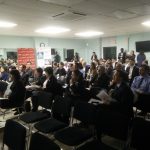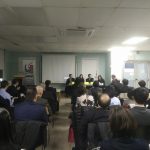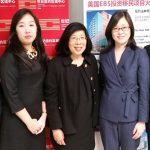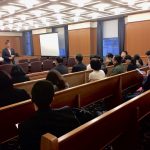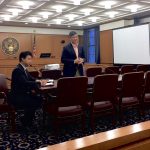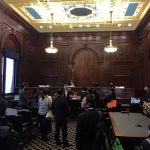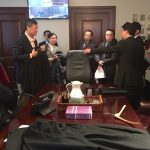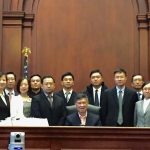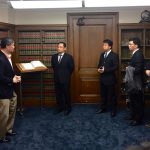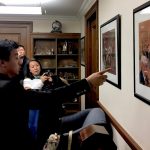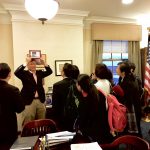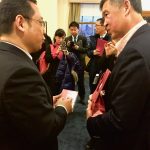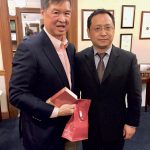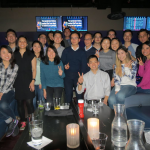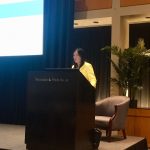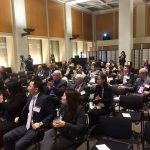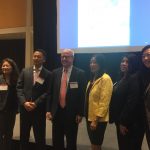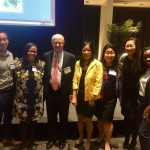NAPABA Inspirational Video Series | Judge Denny Chin
How did the son of a garment factory seamstress and Chinese restaurant cook come to sit in chambers once occupied by Justice Thurgood Marshall?
The December edition of the NAPABA Inspirational Video Series showcases Judge Denny Chin and his path to the United States Court of Appeals for the Second Circuit. Judge Chin leads you on a journey from his immigration to the U.S. from Hong Kong at the age of two to his first law school internship with the Southern District of New York where he realized—almost immediately—that he wanted to become a judge.
Be sure to discuss and share Judge Chin’s story on Twitter, Facebook, and Instagram using the hashtag, #NAPABAInspirationalSeries.
About Judge Chin
Judge Denny Chin is a United States Circuit Judge for the U.S. Court of Appeals for the Second Circuit. He was sworn in on April 26, 2010. He had previously served, from Sept. 13, 1994, through April 23, 2010, as a U.S. District Judge for the Southern District of New York.
In the District Court, Judge Chin presided over a number of important matters, including cases involving Megan’s Law, the Million Youth March, Al Franken’s use of the phrase “Fair and Balanced” in the title of a book, the Naked Cowboy, and the Google Books project. He also presided over two criminal trials arising out of the United Nations Oil for Food Program, as well as the trial of an Afghan warlord charged with conspiring to import heroin, and the guilty plea and sentencing of financier Bernard L. Madoff.
In the Circuit Court, Judge Chin has authored opinions or dissents in cases involving the enforceability of arbitration clauses in on-line agreements, the General Motors bankruptcy, environmental regulations governing the discharge of ballast water from ships, the constitutionality of the government’s seizure and retention of computer hard drives, barriers to access for voters with disabilities, and the streaming of copyrighted television broadcasts over the Internet.
NAPABA Files Amicus Briefs in the Fourth and Ninth Circuits Challenging the President’s Revised Muslim and Refugee Ban
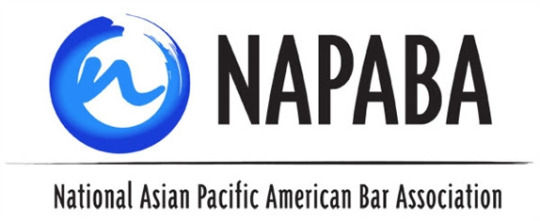
For Immediate Release
Dec. 1, 2017
WASHINGTON — The National Asian Pacific American Bar Association (NAPABA) filed amicus briefs in both the U.S. Court of Appeals for the Ninth Circuit and in the U.S. Court of Appeals for the Fourth Circuit to support the preliminary injunction of President Trump’s September 24, 2017, revised executive order barring refugees and individuals from six Muslim-majority countries and North Korea, along with government officials from Venezuela, from entering the United States.
The Trump Administration’s appeals in these cases, State of Hawaii v. Trump and International Refugee Assistance Project v. Trump, arise from the legal challenges to the third revised executive order, which was announced in September 2017 and set to take effect October 18, 2017. On October 17, Judge Derrick K. Watson of the U.S. District Court for the District of Hawaii granted the temporary restraining order. NAPABA filed an amicus brief in this case on November 22. The U.S. district court in Maryland also enjoined the visa ban on October 17, 2017, and the Administration’s appeal in that case is pending in the Fourth Circuit, where NAPABA filed an amicus brief on November 17, 2017.
“This third order continues the discriminatory and unlawful exclusion promoted by its predecessors,” said NAPABA President Pankit J. Doshi. “As a bar association committed to promoting diversity and inclusion, we are proud to continue to speak out in these cases. As an Asian Pacific American community, we have experienced the harms of exclusionary laws and we will continue to oppose this anti-Muslim and anti-immigrant order.”
NAPABA’s amicus briefs describe decades of statutory exclusion of citizens of Asian and Pacific Island countries under early U.S. immigration law, including the Chinese Exclusion Act of 1882 — the first federal law to ban a group of people on the basis of their race. The Civil Rights Era marked a dramatic turning point that saw Congress dismantle nationality-based discrimination with the Immigration and Nationality Act of 1965. The brief explains that presidential discretion in the area of immigration and refugee admission, while broad, is limited by statute. NAPABA argues that President Trump’s revised order, with its anti-Muslim underpinnings, violates the unambiguous prohibition on discrimination established by Congress.
NAPABA opposed earlier iterations of the executive order, including submitting amicus briefs at the District, Circuit, and Supreme Court level.
NAPABA recognizes lead pro bono counsel, James W. Kim, a NAPABA member and partner at McDermott Will & Emery LLP, in Washington, D.C., Mr. Kim’s team (including Andrew Genz, Joshua Rogaczewski, Philip Levine, Matthew Girgenti, and Llewelyn Engel), NAPABA Amicus Committee co-chairs, Professor Radha Pathak of Whittier Law School and Albert Giang, a partner at Boies Schiller Flexner LLP in Los Angeles, and NAPABA Civil Rights Committee co-chair Meredith Higashi for their leadership drafting the brief, which also involved the efforts of NAPABA staff.
The Ninth Circuit will hear the case on December 6, 2017, in Seattle, WA. The Fourth Circuit will hear the case on December 8, 2017 in Richmond, VA.
For more information, the media may contact Brett Schuster, NAPABA communications manager, at 202-775-9555 or bschuster@napaba.org.
The National Asian Pacific American Bar Association (NAPABA) is the national association of Asian Pacific American (APA) attorneys, judges, law professors, and law students. NAPABA represents the interests of over 50,000 attorneys and over 75 national, state, and local bar associations. Its members include solo practitioners, large firm lawyers, corporate counsel, legal services and non-profit attorneys, and lawyers serving at all levels of government. NAPABA engages in legislative and policy advocacy, promotes APA political leadership and political appointments, and builds coalitions within the legal profession and the community at large. NAPABA also serves as a resource for government agencies, members of Congress, and public service organizations about APAs in the legal profession, civil rights, and diversity in the courts.
NAPABA continues to be a leader in addressing civil rights issues confronting Asian Pacific American communities. Through its national network of committees and affiliates, NAPABA provides a strong voice for increased diversity of the federal and state judiciaries, advocates for equal opportunity in the workplace, works to eliminate hate crimes and anti-immigrant sentiment, and promotes the professional development of people of color in the legal profession.
To learn more about NAPABA, visit www.napaba.org, like us on Facebook, and follow us on Twitter (@NAPABA).
Infinity Law Group Asian Heritage Law School Scholarship
Infinity Law Group Asian Heritage Law School Scholarship
The Asian Heritage Scholarship is open to students who will be attending an accredited US Law School in the fall of 2018 and meet all needed requirements. Candidates are asked to write a short essay describing how their background and experiences in the Asian American community influenced their choice to go to law school and how they plan to use their degree to help give back to their community.
To find out more about the eligibility and application requirements, see the link for more details. Deadline is August 1, 2018.
Bereavement Notice: Norman Lau Kee
AABANY is saddened by the news of the passing of Norman Lau Kee. He was a true pioneer in the Asian American legal profession, being among the first Chinese American lawyers to serve the community in New York’s Chinatown. He also served and led the community through his involvement with the Chinatown YMCA, the Chinese-American Planning Council and the US Asia Institute. AABANY named its Trailblazer Award, presented at the Fall Conference, after Norman Lau Kee. His son Glenn is a Past President of AABANY and was the first Asian American President of the New York State Bar Association.
We send our condolences to Glenn and the Lau Kee family. Below are further details about the wake and giving donations in lieu of flowers.
It is with sadness that the Lau Kee family announces the passing away of Norman Lau Kee on November, 9, 2017. Mr. Kee was a graduate of Massachusetts Institute of Technology and Fordham University School of Law, and served in the US Navy. He began the practice of law in 1956 as the third Chinese-American lawyer to practice in Chinatown. A great civic leader, Mr. Kee also served as Chairman of the Federal Advisory Commission to the Immigration and Naturalization Service, on the New York City Commission of Human Rights, and on the boards of several community organizations. He helped to found the Chinatown YMCA and the US Asia Institute, and was the recipient of numerous civic awards. He was also a sailor, skier and opera lover.
Norman Lau Kee is survived by his wife, Esther; children Glenn, Deborah, Laura Ann, Gail, Valerie; eight grandchildren and one great grandchild. The wake will be held in New York on November 27, 2017, 3:00 pm at Ng Fook Funeral home at 36 Mulberry Street, New York, NY. A memorial event will held in Washington DC on December 7th at the US Asia Institute at 6:00 pm. The family requests that in lieu of flowers, donations can be made to the New York Chinatown YMCA (contactglaukee@laukeelaw.com) or to the US Asia Institute in Washington DC (contact mary.sue.bissell@usasiainstitute.org).



